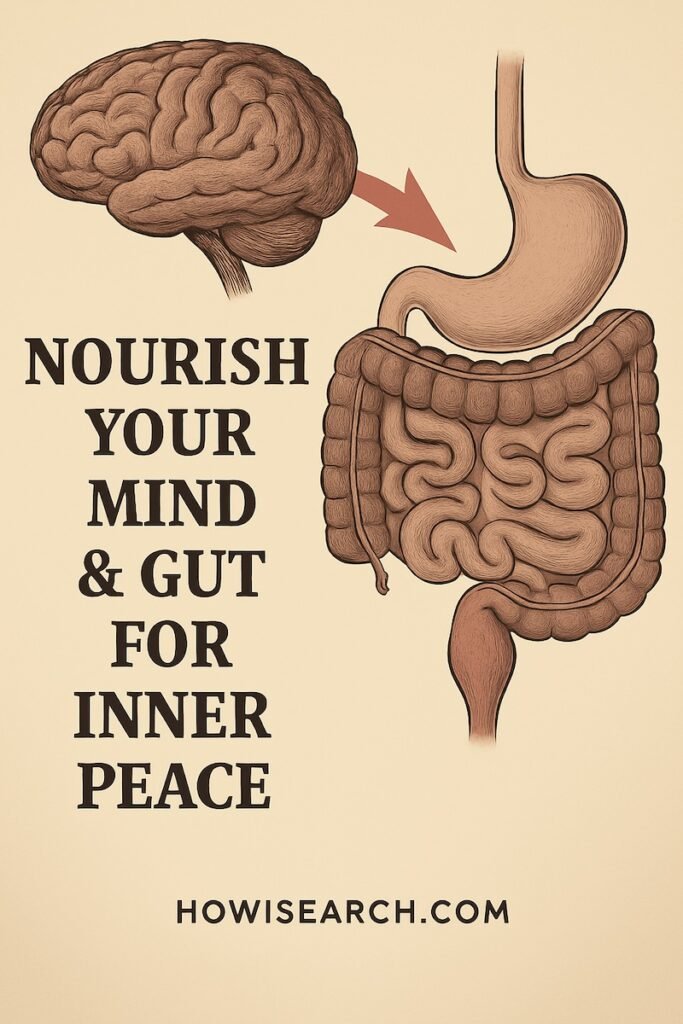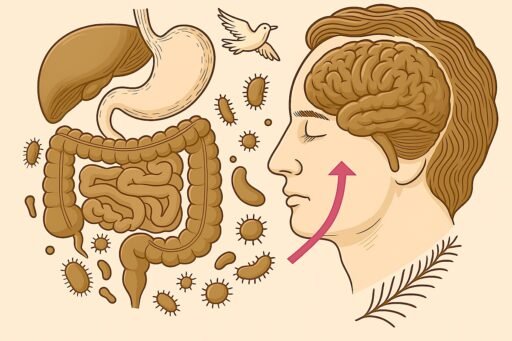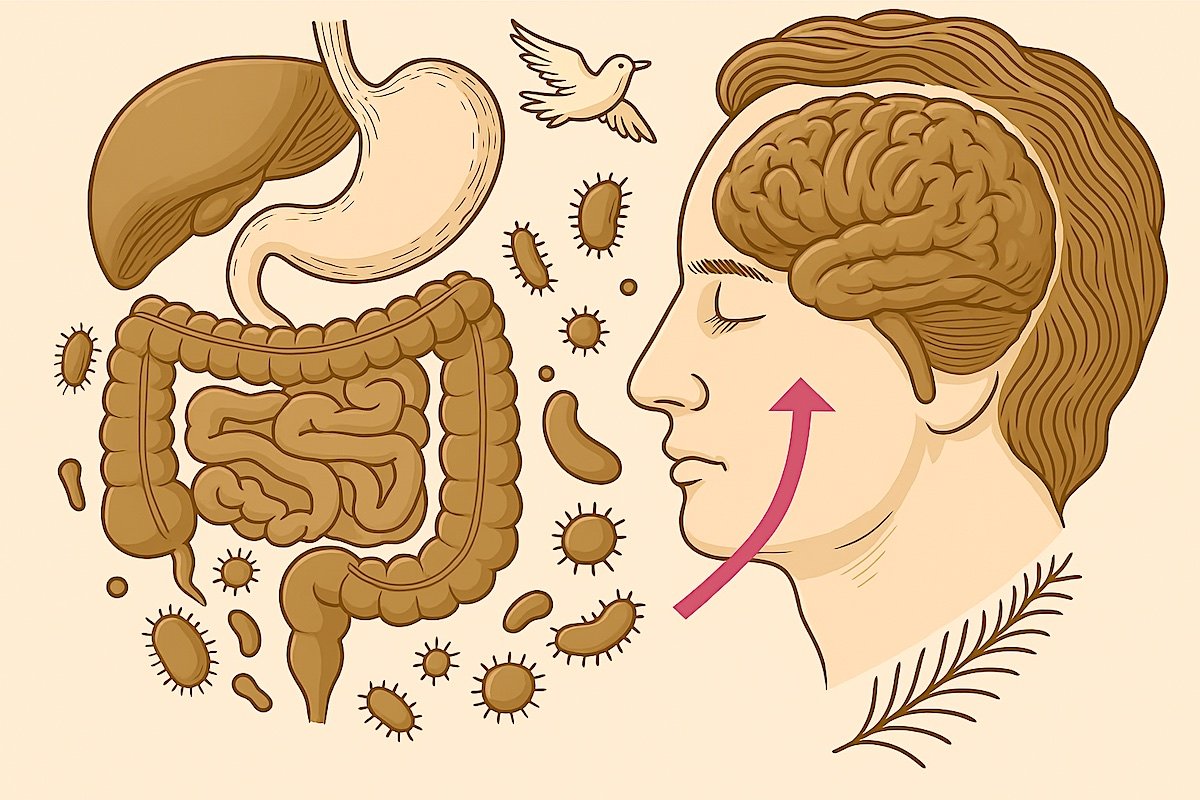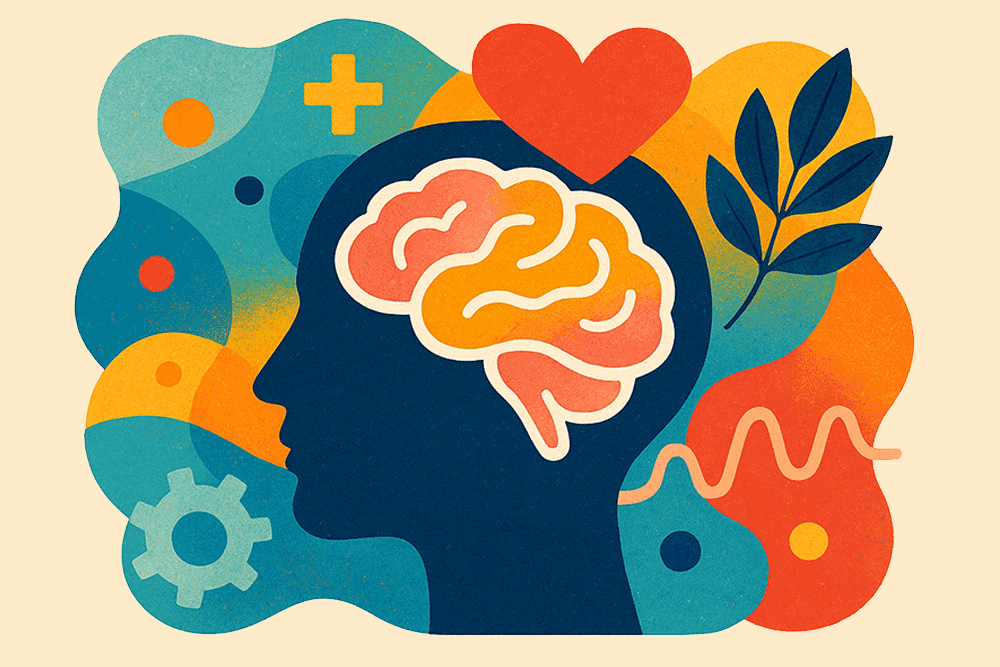Happy Gut, Happy Brain.
In the hustle and bustle of modern life, we often find ourselves feeling fragmented and disconnected. We seek solace in mindfulness apps, escape in digital realms, and sometimes find ourselves grappling with an unsettling dis-ease so profound that no amount of external distraction can entirely quell it.
But what if the profound sense of peace we crave, and the elusive clarity of mind, isn’t just hidden in lofty thoughts or disciplined meditation practices, but rather in the very essence of our being, within our gut?

For far too long, scientists viewed the gut merely as a digestive workhorse and a biological processing plant. At the same time, the brain, with its intricate neural networks and enigmatic consciousness, held the undisputed title of the body’s command center.
Yet, a transformative shift is happening in the scientific community; the gut-brain axis reveals a stunningly complex and vital connection between these two seemingly disparate organs. This emerging field, known as neurogastroenterology, unveils a profound relationship ultimately shaping our emotional well-being, mental clarity, and capacity for inner peace.
The Second Brain: A Bustling Metropolis Within
Imagine your gut not as a simple, meandering tube, but as a vibrant metropolis, filled with trillions of microorganisms, including bacteria, viruses, and fungi, that form the gut microbiome. Far from being passive, these microbes actively engage in our biology, influencing everything from nutrient absorption to immune function while also maintaining a constant, dynamic dialogue with our brain.
This conversation flows through multiple pathways, with the vagus nerve serving as a superhighway of nerves, stretching from the brainstem to the abdomen, transmitting signals in both directions. But the conversation isn’t limited to electrical impulses. Our gut microbes produce a remarkable array of neuroactive compounds, including neurotransmitters essential for mood and brain function. A staggering 90% of serotonin, often referred to as the “happiness hormone,” is predominantly produced in the gut, underscoring its crucial role in our overall well-being. Other microbial byproducts, such as short-chain fatty acids (SCFAs) like butyrate, significantly influence brain health, lessen inflammation, and even cross the blood-brain barrier.
Dr. Emeran Mayer, a leading neuroscientist and gastroenterologist, describes the gut as “our second brain,” referring to the sophisticated enteric nervous system (ENS) that resides within the walls of the digestive tract. This ENS can operate independently, overseeing digestion while maintaining a profound connection with our central nervous system. As Dr. Mayer notes, this intricate network explains why stress can create physical tension in our stomachs, and in turn, why an unsettled gut can lead to feelings of anxiety and mental discomfort.
From Dysbiosis to Disquiet: When the Gut-Brain Axis Fails
When the delicate balance of the gut microbiome is upset—a condition known as dysbiosis—what should be whispers of peace can transform into cries of distress. Factors such as a poor diet (high in processed foods, sugar, and unhealthy fats), chronic stress, antibiotic use, infections, and even environmental toxins can destroy beneficial gut bacteria, allowing harmful pathogenic species to thrive.
The effects extend beyond digestive issues. A dysbiotic gut can lead to increased permeability, often referred to as “leaky gut,” where the intestinal lining becomes compromised, allowing harmful toxins and undigested food particles into the bloodstream. That triggers a systemic inflammatory response, which has profound implications for brain health. Neuroinflammation, a silent fire in the brain, is increasingly linked to a variety of mental health conditions ranging from anxiety and depression to more severe neurological disorders.
Research indicates a strong correlation that those with depression often show altered gut microbiota compared to healthy individuals. Additionally, the exciting exploration of “psychobiotics”—probiotics or prebiotics that can enhance mental health—offers a hopeful vision. The simple yet revolutionary idea shows that nurturing a healthy gut ecosystem may empower us to elevate our mood, reduce anxiety, and cultivate greater emotional resilience.
Cultivating Inner Peace Through Nourishment: A Holistic Approach
The good news is that just as our modern lifestyles can disrupt the delicate balance of the gut microbiome, mindful choices can actively cultivate and restore it, thereby paving a more straightforward path to inner peace. That doesn’t require restrictive diets or quick fixes; instead, it embraces a holistic approach to nutrition and well-being that acknowledges the profound link between body and mind.
By nurturing our gut health, we can find a more direct path to inner peace, inviting harmony and well-being into our lives.
Embrace Fiber-Rich Plant Foods:
Your gut microbes thrive on a diverse range of dietary fiber. Load your plate with a variety of colorful fruits, vegetables, legumes, whole grains, nuts, and seeds. These are “prebiotics” – non-digestible compounds that feed beneficial bacteria, allowing them to create those essential short-chain fatty acids (SCFAs). Think of a colorful plate as a diverse buffet for your microbial friends.
Fermented Foods for the Win:
Elevate your diet with fermented foods, such as yogurt (with live active cultures), kefir, sauerkraut, kimchi, tempeh, and kombucha. These natural sources of “probiotics,” live beneficial bacteria, can help rejuvenate and diversify your gut microbiome. Select varieties with minimal added sugar for optimal results.
Prioritize Healthy Fats and Lean Proteins:
While plant foods hold great significance, healthy fats such as those found in avocados, olive oil, and omega-3-rich fatty fish, along with lean proteins, are vital for overall satisfaction and health. They serve as a shield against cravings for gut-damaging processed foods.
Mindful Eating and Stress Reduction:
The way you eat is just as important as what you eat. Avoid rushing meals, eating under stress, or mindlessly snacking, as these habits can disrupt digestion and the gut-brain axis. Embrace mindful eating: chew slowly, savor flavors, and heed your body’s hunger and fullness cues. Engage in stress-reducing practices, such as meditation, deep breathing, or spending time in nature, recognizing that managing stress is crucial for maintaining gut health.
Hydration is Key:
Water is the essence of all bodily functions, including digestion and nutrient absorption. Staying hydrated ensures proper gut motility and prevents constipation, creating a flourishing environment for your microbiome.
Limit Processed Foods, Sugar, and Artificial Sweeteners:
Be vigilant of processed foods, sugar, and artificial sweeteners, as they can disrupt gut balance. Often void of fiber, they feed harmful bacteria and promote inflammation. Although artificial sweeteners were once believed to be harmless, they’re now understood to pose risks to gut health.
Consider Probiotic Supplements with Caution:
A food-first approach is ideal, but high-quality, multi-strain probiotic supplements can offer support for some individuals, particularly after antibiotic use or during stressful periods. Consult with a healthcare professional to determine the best course of action for you.
The Symphony of Serenity:
The emerging science of the gut-brain connection redefines well-being. It shifts our perspective from seeing the brain as an isolated commander to recognizing the complex, interconnected system that connects our emotional landscape with the health of our inner ecosystem.
Cultivating inner peace is a holistic journey. It’s about the nourishment we offer to the trillions of silent collaborators within us. By caring for our gut, managing stress, and tuning into our body’s subtle signals, we embark on a path of self-care that resonates deeply within. This journey not only enhances digestion but also creates a vibrant internal symphony, where the harmonious melodies of our gut microbiome uplift our entire being, fostering clarity, resilience, and ultimately, a lasting inner peace.
References and Further Reading:
Books:
(As an Amazon Associate, we may earn a small commission from qualifying purchases, at no extra cost to you.)
- “The Mind-Gut Connection: How the Hidden Conversation Within Our Bodies Impacts Our Mood, Our Choices, and Our Overall Health” by Dr. Emeran Mayer. (A foundational text by a leading expert in the field.)
- “Brain Maker: The Power of Gut Microbes to Heal and Protect Your Brain – For Life” by Dr. David Perlmutter. (Focuses on the link between gut health and neurological conditions.)
- “Gut: The Inside Story of Our Body’s Most Underrated Organ” by Giulia Enders. (An accessible and engaging read on the digestive system.)
Articles & Scientific Reviews:
- “Gut-brain axis: The missing link in depression?” (Nature Reviews Neuroscience)
- “The gut microbiome in anxiety and depression: a systematic review” (Clinical Psychology Review)
- “Psychobiotics and the Microbiota-Gut-Brain Axis: A Narrative Review” (Nutrients journal) – Provides an overview of probiotic/prebiotic effects on mental health.
- “Role of short chain fatty acids on astrocytes and microglia in Alzheimer’s disease brain” (Oxford Academic)
Videos/Documentaries:
- “The Gut-Brain Connection” by Dr. Emeran Mayer, UCLA Health lecture, provides a good overview.
- “How the food you eat affects your brain” (TED-Ed) – A good animated introduction for a general audience.
- “The Gut-Brain Axis: How Your Gut Influences Your Mood,” Dr. Matthew Nagra, on YouTube.







